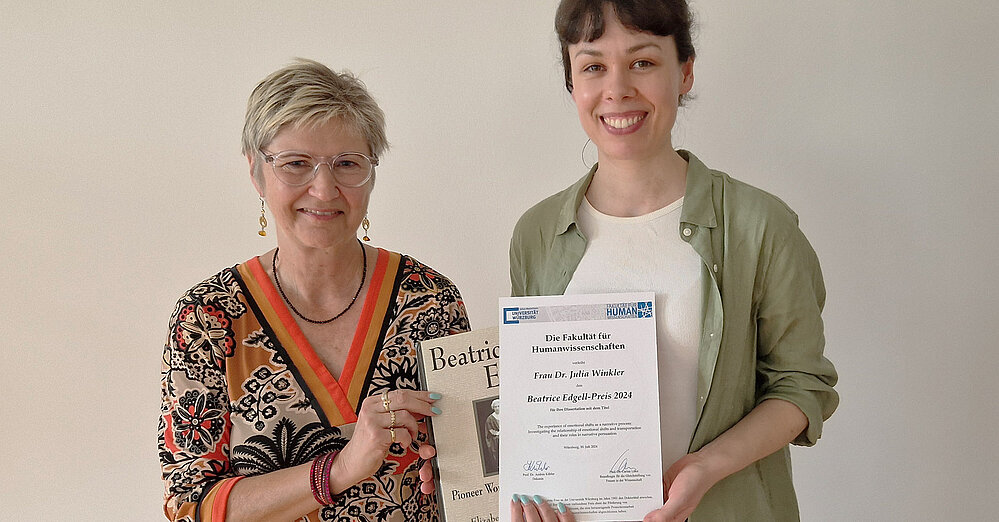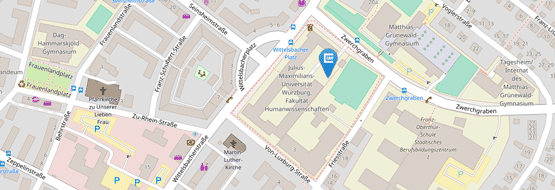Beatrice Edgell Award
Since 2006, the Faculty of Human Sciences has been giving out the Beatrice Edgell Award for outstanding doctoral theses written by women. The award comes with a cash prize of €1,000. The wide range of academic disciplines within the Faculty will be taken into account in the selection process.
It is designed to encourage women to pursue a career in research, advance the careers of female early career researchers and increase their chances of securing research funding, fellowships or junior professorships.
In 1901, British psychologist Beatrice Edgell was the first woman to obtain a doctorate from the University of Würzburg. Her doctoral thesis titled ‘Die Grenzen des Experiments als einer psychologischen Methode’ (‘The Limitations of Experiment as a Psychological Method’) was supervised by Oswald Külpe, a pioneer in the field of experimental psychology. After her return to the UK, Beatrice Edgell embarked on a remarkable academic career at the renowned Bedford College, now part of Royal Holloway, at the University of London.
Beatrice Edgell became the first female professor of psychology in the UK (in 1927) and the first female president of various renowned societies and professional bodies for psychologists in the UK, e.g. of the British Psychological Society (in 1930) and the Aristotelian Society (in 1927).
1) Eligibility requirements:
- Doctorate qualification ‘magna cum laude’ or ‘summa cum laude’; different grading conventions within the respective disciplines will be taken into account
- Publications in the context of the doctoral thesis
- Further publications during doctoral degree (e.g., scientific journal articles, conference contributions, monographs)
- Oral presentations during doctoral degree (e.g., scientific conference contributions)
- Further university commitments (e.g., lectures, seminars, tutorials, third-party funds and donations, academic self-governance)
2) Membership of the Faculty:
- Candidates must be employed at the Faculty of Human Sciences and the first reviewer of their doctoral thesis must be a staff member of the Faculty of Human Sciences.
- The candidates’ future career and development prospects at the Faculty of Human Sciences will be taken into consideration in the selection process.
3) Application requirements:
- Cover letter with a summary of research accomplishments to date (1 page) and outlining future potential for further achievement (1 page)
- Copy of doctorate certificate
- Curriculum vitae with a list of scientific achievements:
- Publications in the context of doctoral thesis
- Further publications during doctoral degree (e.g., scientific journal articles, conference contributions, monographs)
- Oral presentations during doctoral degree (e.g., scientific conference contributions)
- Lectures, seminars, tutorials held
- Further university commitments (e.g., collaboration in research projects, third-party funds and donations, academic self-governance)
Awardees

Dr. Julia Winkler
The Beatrice Edgell Award 2024 goes to Dr. Julia Winkler, a researcher at the Institute of Human-Computer-Media who completed her thesis "The Experience of Emotional Shifts as a Narrative Process: Investigating the Relationship of Emotional Shifts and Transportation and Their Role in Narrative Persuasion" with the grade summa cum laude. In her partially cumulative doctoral thesis she focused on emotional processes during the reception of stories. She developed new methodological approaches to measuring emotions during reception and related evaluation procedures thus illustrating that changes in emotional experience make an essential contribution to the impact of stories. The dissertation was written in the context of the DFG project "The role of emotional changes and event-congruent emotions for persuasion through stories". In her work Dr. Winkler has succeeded in combining basic scientific innovations in the field of recording emotional experience with application-relevant questions on attitudes and behavior in the context of climate change.
Dr. Julia Winkler is an outstanding doctoral candidate at all levels, who, in addition to her partially cumulative doctoral thesis, impresses with further publications and a lively lecture program. Her broad commitment is evident in the areas of teaching, academic self-administration as well as through her review activities and regular further training.
She is a worthy successor to Beatrice Edgell, demonstrating that tackling challenging tasks can lead to personal growth and that overcoming resistance is rewarding. A habilitation project with a view to a long-term career in academia is already in preparation.
| Year | Awardee | ||
|---|---|---|---|
| 2024 | Dr. Julia Winkler ( Psychology of Communication and New Media) | ||
| 2023 | Dr. Kathrin Heeg (Special Education) | ||
| 2022 | Lisa Breitschwerdt (Education) | ||
| 2021 | Dr. Jennifer Tiede (School Pedagogy) | ||
| 2020 | Dr. Isabelle Vilsmeier (Media Psychology) | ||
| 2019 | Dr. Wienke Wannagat (Psychology) | ||
| 2018 | Dr. Diana Löffler (Psychological Ergonomics) | ||
| 2017 | Dr. Christiana Schallhorn (Communication Studies) | ||
| 2016 | Dr. Andrea Beinicke (Psychology) | ||
| 2015 | Dr. Michaela Vogt (School Pedagogy/Primary Education) | ||
| 2014 | Dr. Barbara Schwerdtle (Psychology) | ||
| 2013 | Dr. Manuela Scheuermann (Political Science) | ||
| 2012 | Dr. Katja Likowski (Psychology) | ||
| 2011 | Dr. Katharina Diergarten (Psychology) | ||
| 2010 | Dr. Petra Markel (Psychology) | ||
| 2009 | Dr. Dagmar Fügmann (History of Religion) | ||
| 2008 | Dr. Patricia Grygier (School Pedagogy/Primary Education) | ||
| 2007 | Dr. Andrea Reimherr (Philosophy) | ||
| 2006 | Dr. Christina Schwenck (Psychology) | ||
| Year | Awardee |




